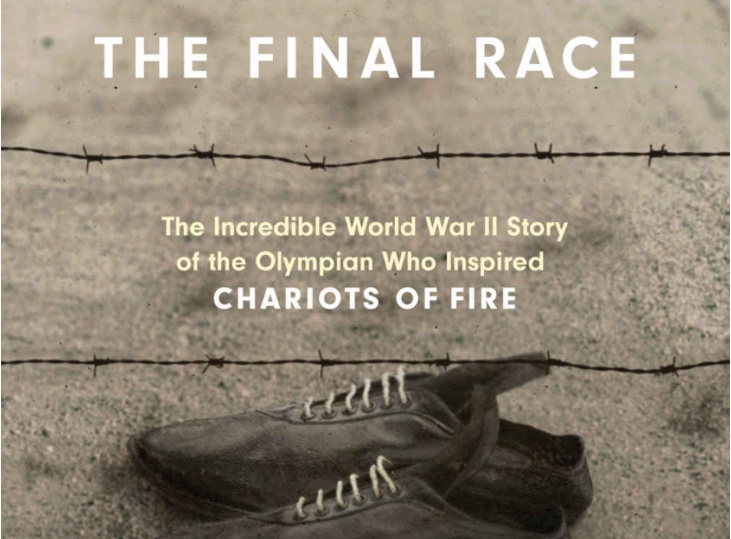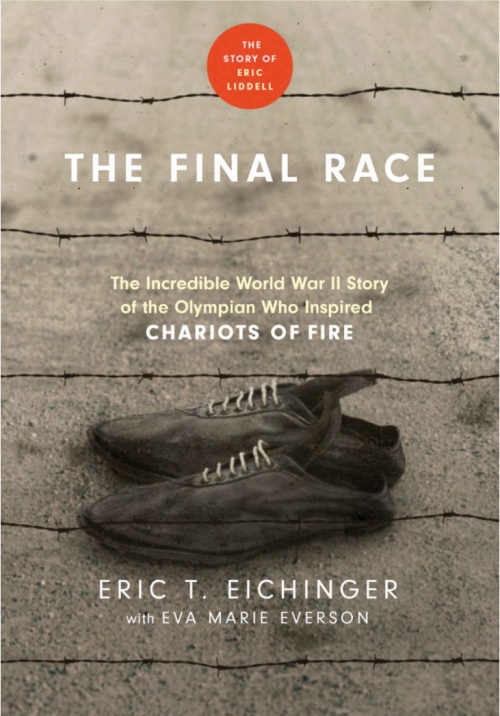
DAVID ADAMS reads the Eric Liddell biography, ‘The Final Race’…
Eric T Eichinger (with Eva Marie Everson)
The Final Race: The Incredible World War II Story of the Olympian Who Inspired Chariots of Fire
Tyndale Momentum, 2018
ISBN-13: 978-1496432452

While for many, knowledge of Liddell’s life starts and ends with his Olympic moment – events which are depicted in the 1981 film, Chariots of Fire, the bulk of The Final Race is devoted to charting how he went on to become a missionary in China, spending years helping others come to Christ before his eventual death in an internment camp toward the end of World War II.
Discipline is a word that’s easy to associate with champion Scottish runner Eric Liddell, the man who famously refused to run the 100 metres at the 1924 Paris Olympics because it was held on a Sunday (a day God had designated for rest) but who went on to win gold in the 400 metres instead. Not only did it take years of disciplined training for Liddell to run like he did, it also took discipline for him to take his stand not to run on the Sabbath.
Yet the word can be equally applied to the rest of his life. While for many, knowledge of Liddell’s life starts and ends with his Olympic moment – events which are depicted in the 1981 film, Chariots of Fire, the bulk of The Final Race is devoted to charting how he went on to become a missionary in China, spending years helping others come to Christ before his eventual death in an internment camp toward the end of World War II.
A Lutheran pastor based in Florida, author Rev Eric T Eichinger, who wrote the book with the assistance of author Eva Marie Everson, says that having been a competitive runner and a teacher in China, he already “felt I had caught a glimpse of what it was like to stand in the shoes of Eric Liddell”. But it was after he made what he terms a “pilgrimage” to the site where Liddell in buried in China that he decided to write the book on Liddell.
The path Liddell chose for himself was not an easy one – his call to missionary work meant he spent long periods away from his wife Florence, whom he married in 1934, and his young growing family (although his own upbringing in which he’d spent his school years away from his own missionary parents while they served in China had no doubt helped prepare him for that).
Meanwhile, the work itself – which saw Eric, who was ordained in the Scottish Congregational Church in 1932, teaching at the London Missionary Society-backed Anglo-Chinese College in Tientsin – meant long hours often with little in the way of reward. Yet, despite it all, sharing the Gospel remained his great love.
“Eric was a missionary, but not a theologically skilled, church-planting missionary,” the authors write of his approach to his missionary call. “Church politics had never been a strong interest for Eric, nor had the arguments and divisiveness they created. As he grew deeper spiritually, Eric’s own opinions developed, but he kept them tamed. His primary interest lay in sharing Christ with those who had never heard of him. If there was anything he could do to assist or aid someone in the assurance if their eternal salvation, he helped, and happily so.”
World War II was to have a dramatic impact on Liddell’s life. With his family by then safely in Canada, Liddell, along with other British nationals, was initially placed under house arrest – a time he used to write his book, The Disciplines of the Christian Life. But in early 1942, he and other foreign nationals were interned in a former American Presbyterian mission at Weihsien, some 400 miles away from Tientsin. There, amid the hardships and deprivations the community faced, Liddell continued his life’s work, teaching, coaching and sharing Christ, particularly among young people.
“Eric’s disciplined and methodical approach to life, with his solemn religious routines, soon became apparent not just to the youth but the numerous adults as well,” the authors write. “The beauty of Eric’s style was that he would inevitably pique the interest of others. Eric had never been one to force his faith on anyone, but once invited to chat about it, Eric’s faith never failed to roar with ferver. And prison life had not weakened Eric’s beliefs but rather had strengthened them.”
Sadly, however, it was in the camp that on 21st February, 1945, just months before the war’s end, that Eric died from what was found to be a brain tumour. In a moving epilogue, Eichinger writes that the legacy of Liddell “is the legacy of all Christians – to run their own race of faith and to share that faith as best they can, passing the burning torch to the next runner”.
Supported by meticulous and painstaking research, The Final Race is a detailed examination of the all-too-short life of Eric Liddell beyond his momentous decision at the 1924 Games. It brings to life a sense of the selfless devotion Liddell had to God and His Gospel call and, for those familiar only with Chariots of Fire, provides new insights into the life of a man Scotland still regards as a national hero.





